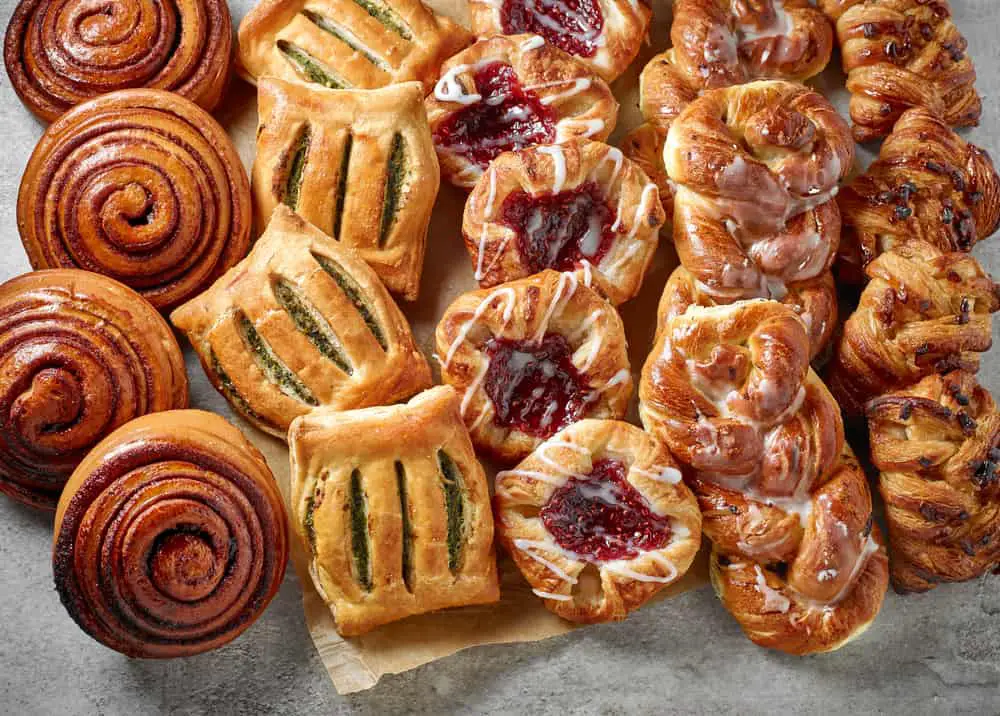Pastry flour will do the trick when looking to bake soft and tender treats. The upside is that it is nutrient-dense as it contains germ and bran; thus, perfect for baking biscuits, pancakes, cakes, cookies, and pie crust. Read on to find out the nutritional value of pastry flour and whether it’s among the healthy flour options.
Nutritional Value of Pastry Flour
There are many types of pastry flour brands in the market, and each has varying nutritional value. So, when shopping for pastry flour; bleached, unbleached, or whole wheat pastry flour, make sure to check the nutritional mix and ensure it meets your needs.
The following is the nutrition value in one cup of pastry flour:
- Calories: 120 g
- Fat: 0.5 g
- Carbs: 26 g
- Sodium: 0 g
- Protein: 3 g
- Fiber: 1 g
- Sugar: 0 g
Is Pastry Flour Healthy?

Yes. Unlike cake flour which is finely milled and bleached, pastry flour only undergoes fine milling but is not bleached. Therefore, it retains some of the germ and bran, which are vital for our bodies. And it also has other essential minerals and nutrients. The fiber helps regulate your body’s sugar utilization. It also helps control hunger and blood sugar.
If you have loose stool, the fiber present in whole wheat pastry flour will help solidify the stool by absorbing the water; thus maintaining bowel health.
Whole wheat pastry flour is healthier than pastry flour as it is milled from whole grain and wheat berries. This flour has lower protein content, higher levels of fiber, vitamins, and minerals.
Irrespective of the health benefits, whole wheat pastry flour has its downsides. Because it has a significant amount of gluten, it is not ideal for people with celiac disease and gluten sensitivity. Whole wheat pastry flour is not good when consumed in large amounts as it raises your cholesterol levels. This may clog up your arteries, disrupting blood flow.
It also disrupts your blood sugar levels, as it releases sugar into your capillaries, causing a spike in your insulin levels. And this may eventually lead to the development of type II diabetes.

Too much consumption of goods baked with whole wheat pastry flour gives your body a massive dose of fats and refined carbs. This disrupts your metabolism and may eventually lead to inflammation, hyperinsulinism, and insulin resistance. This makes the chances of developing heart diseases, arthritis, cancer, and Alzheimer’s very high.
Other adverse effects of overconsuming baked desserts include changes in your mood swings and increased food cravings, leading to weight gain.
Although goodies baked with whole wheat pastry flour and pastry flour are not healthy, they cannot be avoided as they make the perfect breakfast; therefore, make sure to consume them in moderation to prevent the health issues discussed. Also, ensure that your diet is balanced with plenty of fruits and vegetables. Make proper lifestyle adjustments, such as exercise to burn off extra calories.
Does Pastry Flour Contain Additives?
No. Whole wheat pastry flour is made from soft white or soft red wheat. It is unbleached and organic, meaning that there are no other additives, and it is GMO-free. Pastry flour has a fresh taste and aroma, with a natural off-white shade and delicate texture. In some instances, you will find bleached pastry flour, which may contain residue of chlorine gas.
Since it does not have any preservatives, it should be refrigerated to retain its freshness.
Although pastry flour does not have any additives, you should note that most baking flour has ascorbic acid, also referred to as vitamin C. In some cases, you might find alpha-amylase, which is a naturally occurring enzyme in wheat. It is not harmful, and it helps standardize your flour, enabling it to bake more consistently.
Does Pastry Flour Help with Weight Loss?

If you are trying to lose weight, don’t make consuming pastry flour snacks. This is because the pastries contain artificial fats, refined flour, and sugars, which are harmful to your body and lead to many diseases.
Pastries also cannot quench your hunger, so you will be become hungry very soon after consuming that cake or muffin. And since they are high in calories and low in nutrients, this means you are just packing weight.
However, do not restrict yourself from consuming baked goods made with pastry flour for days to lose weight. This is because the moment you take a bite of that cake or scone, you will be tempted to stuff yourself, which will undo all your hard work. Instead, make a point of consuming baked goods in moderation.
Is Pastry Flour Easy to Digest?
Whole wheat pastry flour is suitable for your digestive system. During processing, it is not stripped of its germ, bran, and endosperm. Therefore, it has plenty of fiber that moves through your digestive tract, softening your stool while making it bulk. It helps with irregular bowel movements and reduces instances of constipation. So when you eat a piece of cake made with whole wheat flour, you relieve pressure in your intestines. It also helps prevent the development of diverticular disease, which happens in the colon, causing swelling and irritation.
When the goodies made with pastry flour are light, soft, and tender, they are easier to digest. However, when pastry flour is used as the batter, it makes it so hard to digest. This is because the fat used to deep fry them is not acted upon by saliva in the mouth nor the gastric juice in the stomach. Thus, they enter the small intestine undigested. The pancreatic juice removes the fats and digests them together with the food. However, since that’s not their work, much of the food is passed on undigested. The food is also passed on unprocessed because there is little water present in the fat-coated granules. Thus they cannot swell and rise. Pastry flour must absorb sufficient water to swell and rise, making them easily digestible.
Summing Up
If you want to bake a healthy breakfast for your family, use whole wheat pastry flour as it contains the bran, germ, endosperms, and a load of nutrients and minerals. Some of the goodies you can make include cake, muffins, cookies, pastries, and pies.
